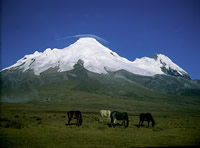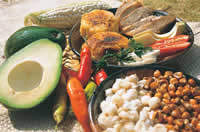|
Part of this information was based in the Health
section of www.ecuadorexplorer.com.
| Introduction
| Weather & Altitude Sickness |
| Insects | Yellow Fever
| Food | Malaria |
| Pharmacies | Medical
Care |
Health in
Ecuador
If you are planning a trip to Ecuador you should take some considerations
on your health care. Our country's geography and climate, in certain
cases may influence in the appearance of some ills. Also you should
be precautious, specially in tropical areas, from diseases transmitted
by insects. Last but not least, you need to be particularly cautious
with respect to what you eat and drink because in some places food
isn't always prepared with the best conditions of cleanness.
TOP
Weather
and Altitude Sickness
 |
Ecuador's weather is characterized
for being very variable. In some places you can experience, in a
single day, strong changes in temperature. This very common in the
Andean region, where you can enjoy sunny mornings and electric storms
followed by strong rains in the afternoon. High factor sunscreen,
sunglasses and also warm clothes are recommended.In the Andean region
you should be also cautious of altitude sickness. Ecuador is home
to some of the highest volcanoes and mountain peaks in the world.
Someone flying from New York City to Quito, for example, experiences
an elevation change of nearly two miles in a little more than 6
hours. Abrupt changes in elevation such as this sometimes have ill
effects on travelers.Altitude sickness usually manifests itself
in insomnia, headaches, and/or nausea. To prevent altitude sickness,
or to at least stave off some of its effects, ascend gradually to
provide your body with time to adjust to the change. Obviously,
if you are flying into Quito this will be impossible. The first
thing you have to do is to avoid extreme physical efforts for the
first two or three days. (Ex: running, lifting heavy objects, practicing
sports) In the event that you do experience symptoms of altitude
sickness, in most cases, they can be remedied by drinking lots of
water, getting lots of rest, and taking aspirin.
TOP
Insects
No vaccine is required to enter Ecuador, but is good to know that
in certain areas of the country, (tropical areas) exist the presence
of insects that may transmit illness. The most common illness founded
in tropical areas are malaria and yellow fever.
TOP
Malaria
On account of Ecuador's diverse geography, there is risk for Malaria
in some parts of the country and not in others. Mosquitoes, the
primary carriers of malaria, do not like heights. As a result, travelers
run little risk of getting Malaria while in the mountains and mountain
valleys of Ecuador's High Sierra Region. On the other hand, because
mosquitoes thrive in the Ecuador's hot and humid Coastal region
and the Amazon jungle lowlands, you must take the appropriate precautions
while traveling in these regions.Travelers can eliminate much of
the Malarial risk by taking prescription antimalarial drugs and
protecting themselves against mosquito bites. You can protect yourself
from mosquito bites by using insect repellent (the repellent must
contain DEET), always wearing long-sleeved shirts and long pants,
and sleeping beneath mosquito nets.
TOP
Yellow
Fever
Yellow Fever is a very rare cause of illness for travelers, but,
if you plan on spending time in the rainforest or coastal lowlands,
you should get immunized. Like Malaria, Yellow Fever is a disease
transmitted to humans by mosquitoes. Likewise, you should follow
the same precautions as with Malaria. Employ insect repellent, protective
clothing, and mosquito netting to minimize the risk of bites from
infected mosquitoes.
TOP
Food
 |
One of the most common problems
for travelers are the effects of food and water. This may occur
because of two reasons. First, food may not be prepared hygienically
(food vendors, popular markets, restaurants that may not seem clean)
and second, the foreign immune systems are not accustomed to some
bacteria or parasites present in food. (fruits, ice, tap water).
The symptoms appear as relatively mild stomach and intestinal tract
problems (diarrhea and occasionally vomiting).While in Ecuador,
eat only well cooked food or fruits and vegetables you have peeled
yourself, do not eat un-pasteurized dairy products, refrain from
eating food sold by street vendors, eat only in restaurants that
seem clean, and avoid ice in drinks. Drinking tap water is not advisable
anywhere in Ecuador, so drink only bottled or boiled water. In case
of a long trip to a place where you can't buy bottled water, you
should buy water-purifier pills. Water-purifiers can be found in
most camping/outdoor supply stores.
TOP
Pharmacies
You can find hundred of pharmacies in urban zones. Usually, in the
big cities they are open in regular business hours, and you can
find many of them open 24-hours a day. Some others (usually in residential
neighborhoods) operate on a rotation system - look out for an illuminated
"Turno" sign outside.It's very common to find a medic
in each pharmacy, and they are pretty reliable for recommending
a medicine or place injections. But in case of a serious illness
or symptom is better to find an specialist.
TOP
Medical
Care
Good medical care is available in Quito, Guayaquil, and most of
the big cities. There is a lack of hospital infrastructure in small
towns but you will find health centers that provide first aids.
In Quito, Guayaquil and most of the province's capital cities you
will find well trained and specialized doctors, many of them bilingual.
Some embassies have lists of excellent multi-lingual doctors.
Part of this information was based in the Health
section of www.ecuadorexplorer.com.
TOP
| Introduction
| Weather & Altitude Sickness |
| Insects | Yellow Fever
| Food | Malaria |
| Pharmacies | Medical
Care |
|

